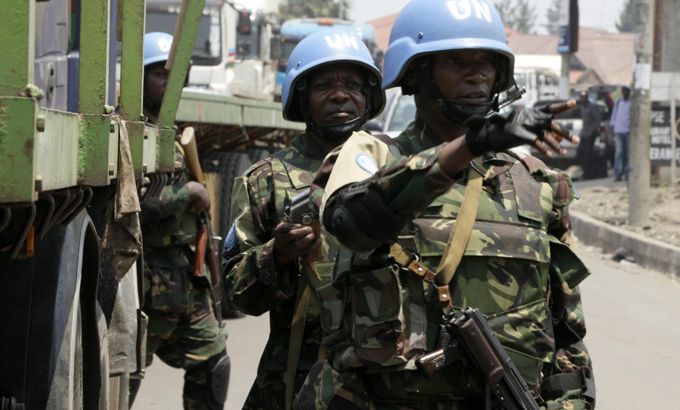DR Congo rebels announce troop withdrawal
M23 rebel chief says fighters to withdraw from frontline of fighting in country’s east, as violence spikes.

The M23 rebel movement in the Democratic Republic of Congo will be withdrawing troops from the frontline of fighting with Congolese and UN forces, according to the group’s chief.
Bertrand Bisimwa, the civilian president of M23, told Al Jazeera on Friday that his troops were withdrawing in order to allow what he called independent verifiers to enter the area of the battle to assess where shells had fallen in the nearby city of Goma and across the border in Rwanda.
He denied that his troops were withdrawing because of battlefield casualties, an assertion that the government made.
Bisimwa did not clarify how far back the M23 would be withdrawing, Al Jazeera’s Malcom Webb reported from the eastern city of Goma.
The withdrawal comes a day after a UN peacekeeper was killed and another seven wounded in fighting between the M23 and UN-assisted Congolese forces.
The fighting was some of the fiercest in the week since the newly created UN intervention brigade went on the offensive, and one Tanzanian peacekeeper was killed after the rebels aimed artillery fire at their position, the UN said in a statement.
The UN said on Thursday that it had also established that there were “consistent and credible reports” of Rwandan troops entering the Democratic Republic of Congo to back the M23 rebels.
Rwanda’s role
Rwanda has consistently denied supporting the rebels. It accused its Central African neighbour of persistently shelling into its territory and said such “provocation” could no longer be tolerated.
Deputy UN peacekeeping chief Edmond Mulet briefed the UN Security Council on the situation and said that the UN mission in Congo – known as MONUSCO – had seen only the M23 rebels shelling into Rwanda, according to Deputy French Ambassador Alexis Lamek.
Following Thursday’s fighting near the Kibati village, about 15km from provincial capital Goma, the rebels said that they remained committed to finding a peaceful solution to the conflict.
Rene Abandi, the head of the M23’s Kampala delegation, said the group was ready for a unilateral ceasefire once Kinshasa laid down its weapons.
“[There are] those innocent people who are dying while our side is here for peace talks, and all the while the other side is refusing. The other side who is not here is the only responsible of all those deaths. The only thing we are tired with, is to declare unilateral ceasefire and to see the other side continuing to bomb and to attack. But at any hour of day or night, if the government accepts, we are ready for a bilateral ceasefire,” Abandi added.
The rebels also blamed recent deaths in Goma on the Congolese government and the UN.
UN involvement
The UN involvement in the latest flare-up of violence is in sharp contrast to November, when the UN peacekeeping mission stood by as the rebels overtook Goma because their mandate was only to protect civilians.
The stepped-up 3,000-strong UN intervention brigade, created by the Security Council in March, is authorised to take the offensive against the rebels.
Even as forces hit rebel positions, UN officials continued to send mixed messages about the extent of their involvement, repeatedly saying they were merely “backing” or “supporting” the Congolese military, rather than leading the offensive themselves.
“The main engagement is by the [Congolese] forces,” said Siphiwe Dlamini, a spokesman for the South African military, which contributed troops to the brigade. “We are retaliating and going on the offensive.”
Lt-Col Felix Basse, the military spokesman for the UN peacekeeping mission, also emphasised that UN forces were fighting alongside the Congolese army.
The M23 fighters launched their rebellion last year and peace talks with the Congolese government have repeatedly stalled.